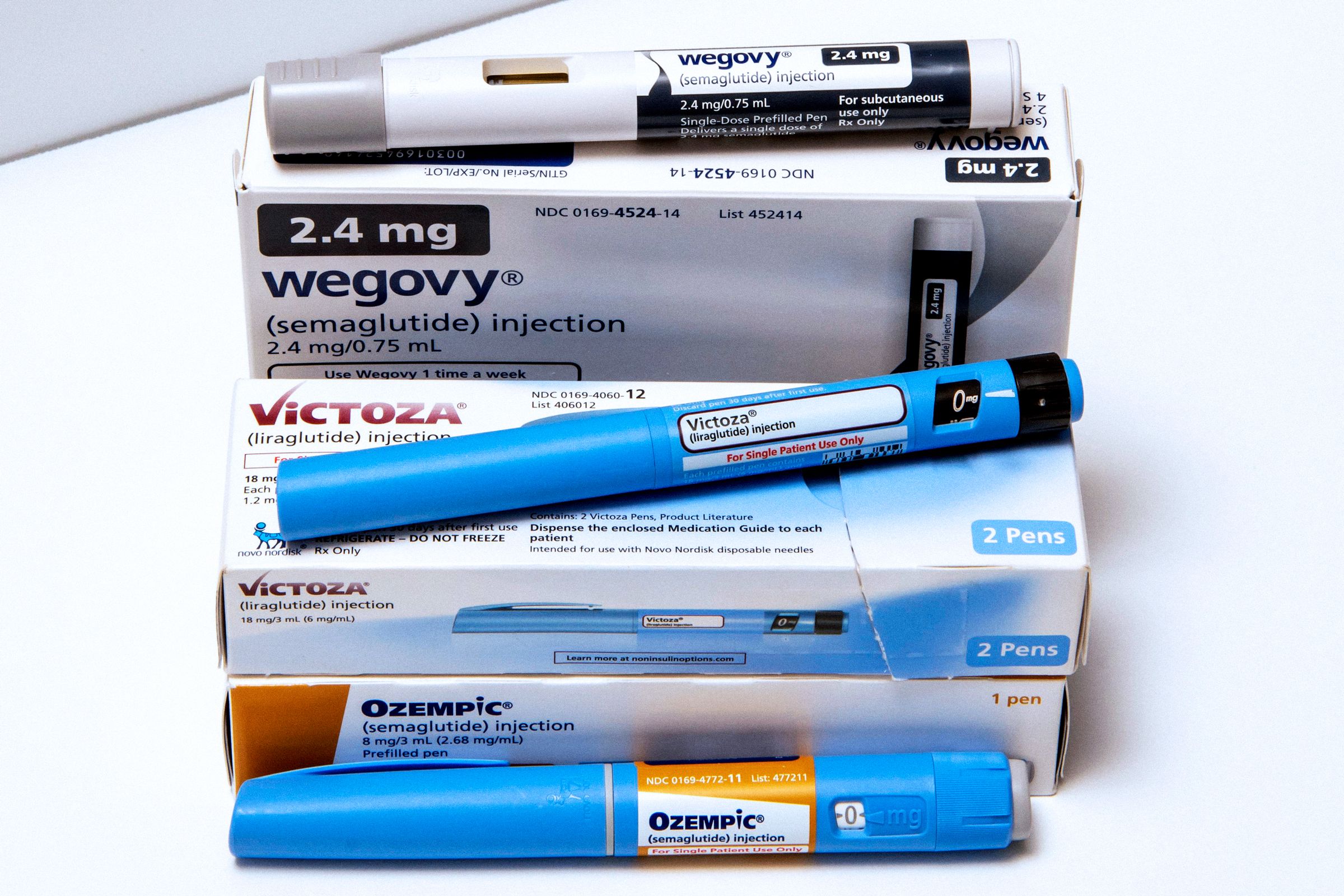After telehealth startups recently lost the ability to sell exact copies of patented GLP-1 weight-loss drugs, some firms have begun turning to a different, less effective medication that has been on the market in the United States since 2010. Often considered a precursor to blockbuster products like Novo Nordisk’s Ozempic and Eli Lilly’s Zepbound, liraglutide is becoming the new darling of online clinics offering prescription weight loss and diabetes meds—despite its relative old age.
Originally sold by Novo Nordisk under the brand names Victroza and Saxenda, the drug has been available in generic form in the US since last year. Like Ozempic, liraglutide is a GLP-1 agonist that mimics a naturally occurring hormone and works by suppressing hunger cues and regulating insulin levels. But it doesn’t have the same name recognition or popularity as the newer GLP-1 drugs for a very simple reason: It doesn’t work as well, can cause more severe side effects, and patients have to inject it daily rather than weekly.
The FDA determined earlier this year that patented medications like Zepound and Ozempic were no longer in shortage, ending provisions that allowed online clinics to sell off-brand, compounded versions of the drugs. As clinics and manufacturers wind down sales of those compounds, many online clinics and manufacturers are embracing liraglutide. Leading telehealth company Hims added generic liraglutide to its lineup last month, joining over a dozen competitors already offering the product in compounded, generic, or name-brand forms.
Large compounding pharmacies, like Florida-based Olympia Pharmaceuticals, are already pivoting to producing the medication, expecting that demand will rise. “We’ve signed some pretty large contracts for liraglutide,” says chief financial officer Joshua Fritzler. “We can treat it kind of the same way we treated semaglutide and tirzepatide,” the active ingredients in Ozempic and Zepbound. Fritzler says Olympia plans to begin ramping up production this summer.
GLP-1 medications like Ozempic and Zepbound have been heralded for their unparalleled success in treating obesity and type 2 diabetes. Researchers believe they also have the potential to help patients suffering from a wide variety of other conditions, from addiction to Parkinson’s. After demand for GLP-1s exploded in recent years, the FDA declared that some of the name-brand versions were officially in shortage. That meant doctors could legally prescribe cheaper “compounded” versions of semaglutide and tirzepatide with the same active ingredients as the originals.
Compounding pharmacies and telehealth startups flourished selling these alternative GLP-1 products online, attracting millions of customers who couldn’t afford or were unwilling to pay higher prices for the name-brand medications, which are frequently not covered by insurance. Now, the shortages for both these meds have ended. The FDA’s grace period for manufacturers to stop producing and selling compounded tirzepatide is over, and the cut-off date for semaglutide is May 22. Liraglutide, though, has been in shortage since April 2023, so the compounders are free to keep making it.
Some telehealth companies are continuing to offer compounded medications they say aren’t technically direct copies of patented drugs because they come in customized doses or with added vitamins. Eli Lilly has already sued some of them, alleging that these versions are illegal. Other telehealth firms and compounders are playing it safe, ceasing sales altogether. (Olympia, for example, is stopping production of semaglutide.)
Liraglutide is especially appealing for these companies, since it’s the closest thing they can safely produce and sell that still qualifies as a kind of Ozempic dupe. Some are even marketing it as a substitute for other drugs. The online clinic Ageless RX, for example, calls liraglutide as “an easy transition for those switching from another GLP-1 medication.” (Ageless RX did not respond to a request for comment)
Doctors tell WIRED that prospective patients should carefully assess whether liraglutide is really an appropriate alternative for them. While many people will likely respond positively to the medication, data suggests that tirzepatide and semaglutide are superior drugs for most patients. In clinical trials and other studies, those drugs outperform liraglutide, producing substantially more weight loss while causing fewer side effects.
“It is better than nothing, but expectations should be held in check,” says Justin Ryder, a pediatric obesity expert at Northwestern University and vice chair of research in the surgery department at Lurie Children’s Hospital of Chicago. “People who are looking for profound weight loss will likely be disappointed.” Since patients often need to stay on GLP-1 medications indefinitely to maintain results, liraglutide’s daily injection may also prove to be a major hurdle for long-term success.
“People should do the math,” suggests obesity medicine specialist Angela Fitch. While the liraglutide sold by online clinics may initially appear to be cheaper than newer generations of drugs, the savings might not be so clear-cut in reality. The fact that liraglutide is prescribed to be taken daily rather than weekly means larger doses may be required to trigger comparable weight loss. “It might be more affordable to take a more potent drug,” Fitch says.




